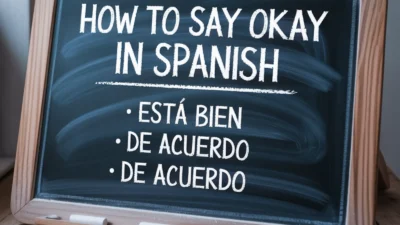Learning how to say goodbye in German helps you communicate politely and naturally in any situation, whether you’re traveling, studying, or meeting German speakers.If you’re learning the language, one of the first things you’ll want to know is how to say goodbye in German. Just like in English, German offers a variety of ways to say farewell depending on the context—formal, casual, or regional.
The most common phrase is “Auf Wiedersehen,” but you’ll also hear expressions like “Tschüss,” “Bis bald,” and “Servus.”
Each phrase carries its own tone and cultural meaning, making your conversations more authentic. Mastering these goodbyes shows respect and helps you sound more like a native speaker.
Say Goodbye in German
Let’s explore 15 different ways to say goodbye in German, complete with dialogue and a peek into their history, cultural use, or regional background.
15 Ways to Say Goodbye in German
| No. | Phrase | Meaning | Use |
|---|---|---|---|
| 1 | Tschüss | Bye | Casual everyday. |
| 2 | Auf Wiedersehen | Goodbye (formal) | Respectful situations. |
| 3 | Wiedersehen | See you | Semi-formal. |
| 4 | Bis später | See you later | Same day meet. |
| 5 | Bis bald | See you soon | Friendly tone. |
| 6 | Bis morgen | See you tomorrow | School/work. |
| 7 | Mach’s gut | Take care | Warm goodbye. |
| 8 | Ciao | Bye/See ya | Youth casual. |
| 9 | Gute Nacht | Good night | Night time. |
| 10 | Auf Wiederhören | Goodbye (phone) | Phone calls only. |
| 11 | Tschüssi | Byee (cute) | Close friends. |
| 12 | Bis gleich | See you in a bit | Meeting soon. |
| 13 | Pass auf dich auf | Take care of yourself | Caring tone. |
| 14 | Wir sehen uns | We’ll see each other | Casual farewell. |
| 15 | Schönes Wochenende | Have a nice weekend | End of week. |
1. Auf Wiedersehen – “Until we see each other again”
Origin:
A classic and formal farewell, this literally means “on seeing again.” It has been used since the 18th century and remains one of the most proper ways to say goodbye.
Example:
👤 User A: Vielen Dank für Ihre Hilfe.
👤 User B: Gern geschehen. Auf Wiedersehen!
Use: Formal and polite; great for meetings, stores, or with strangers.
2. Tschüss – “Bye”

Origin:
This is the most common informal goodbye in German. It became widespread in the 20th century and is friendly and short.
Example:
👤 User A: Ich muss los.
👤 User B: Alles klar. Tschüss!
Use: Informal; great for friends, classmates, or casual chats.
3. Ciao – “Bye” (borrowed from Italian)
Origin:
Borrowed from Italian, “Ciao” has made its way into everyday German, especially among younger speakers and in urban areas.
Example:
👤 User A: Okay, bis morgen!
👤 User B: Ciao!
Use: Informal and stylish; trendy among youth.
4. Servus – “Bye” (Southern Germany/Austria)

Origin:
This farewell comes from Latin servus humillimus (“your humble servant”) and is still widely used in Bavaria and Austria.
Example:
👤 User A: Ich geh dann mal.
👤 User B: Servus, mach’s gut!
Use: Regional; friendly and warm.
5. Bis später – “See you later”
Origin:
Literally “until later,” it’s perfect for when you expect to see the person again soon.
Example:
👤 User A: Ich muss noch einkaufen.
👤 User B: Kein Problem. Bis später!
Use: Casual; used with friends and coworkers.
6. Bis bald – “See you soon”
Origin:
Similar to Bis später, but with an even warmer tone that implies you’re looking forward to seeing the person again.
Example:
👤 User A: Ich ruf dich morgen an.
👤 User B: Super. Bis bald!
Use: Friendly, positive tone.
7. Bis dann – “See you then”

Origin:
Often used when a next meeting is planned. “Dann” refers to “then,” as in the scheduled time.
Example:
👤 User A: Wir treffen uns um sechs, oder?
👤 User B: Genau. Bis dann!
Use: Casual and forward-looking.
8. Mach’s gut – “Take care”
Origin:
Literally “make it good,” this phrase is the German version of “take care” and has been used informally for decades.
Example:
👤 User A: Ich fahr jetzt heim.
👤 User B: Okay, mach’s gut!
Use: Casual and caring; common among friends and neighbors.
9. Schönen Tag noch – “Have a nice day”
Origin:
Common in stores and businesses, this is a polite and friendly way to end a conversation.
Example:
👤 User A: Danke für den Kaffee.
👤 User B: Gern. Schönen Tag noch!
Use: Polite; used in service or public settings.
10. Gute Nacht – “Good night”
Origin:
Standard for evening farewells when someone is heading to bed or you’re parting ways late at night.
Example:
👤 User A: Ich geh jetzt schlafen.
👤 User B: Okay, gute Nacht!
Use: Night-time only; gentle and caring.
11. Auf Wiederhören – “Goodbye” (on the phone)
Origin:
Literally “on hearing again,” this is used specifically for telephone conversations.
Example:
👤 User A: Danke für das Gespräch.
👤 User B: Ich danke Ihnen. Auf Wiederhören!
Use: Formal and professional phone calls.
12. Leb wohl – “Farewell”

Origin:
An older, poetic way of saying goodbye, it literally means “live well.” It’s not commonly used in conversation but may appear in literature or emotional farewells.
Example:
👤 User A: Ich werde dich nie vergessen.
👤 User B: Leb wohl, mein Freund.
Use: Emotional, dramatic, or literary.
13. Man sieht sich – “See you around”
Origin:
This is a relaxed phrase similar to “catch you later,” literally meaning “One sees each other.”
Example:
👤 User A: Ich geh dann mal.
👤 User B: Okay, man sieht sich!
Use: Informal and easygoing.
14. Adieu – “Farewell” (from French)
Origin:
Borrowed from French, “Adieu” has a poetic or dramatic flavor. It’s more common in Switzerland or older literary styles.
Example:
👤 User A: Das ist unser letzter Abschied.
👤 User B: Adieu, mein Lieber.
Use: Dramatic or poetic goodbyes.
15. Tschö – “Bye” (Cologne/Rhineland dialect)
Origin:
A regional twist on Tschüss, “Tschö” is used in western Germany, especially around Cologne.
Example:
👤 User A: Ich bin dann mal weg.
👤 User B: Tschö! Bis morgen.
Use: Dialect-based, very casual and friendly.
FAQs
1. What is the most common way to say goodbye in German?
The most common word is Tschüss, used casually among friends and family.
2. How do you say goodbye politely in German?
Use Auf Wiedersehen, especially in formal or respectful situations.
3. Is Tschüss formal or informal?
Informal. It’s best for friends, classmates, and close contacts.
4. When should I use Auf Wiedersehen?
Use it with teachers, elders, professionals, or in any official setting.
5. Can I shorten Auf Wiedersehen?
Yes, the casual spoken version is Wiedersehen!
6. How do Germans say “Bye” on the phone?
They often say Tschüss or Auf Wiederhören (specifically for phone calls).
7. What is a cute or friendly goodbye?
Tschüssi or Tschüsschen — playful and cute.
8. How do you say “See you later” in German?
Bis später!
9. How do you say “Good night” when leaving?
Gute Nacht! — used when it’s nighttime and you’re parting.
10. How do young people say bye casually?
They also use Ciao, borrowed from Italian, very common in everyday speech.
Conclusion:
Now that you’ve explored how to say goodbye in German, you can end conversations with confidence and cultural awareness.From formal expressions like “Auf Wiedersehen” to friendly goodbyes like “Tschüss” or “Bis später,” each phrase fits a unique situation.Using the right goodbye shows respect and helps you connect more naturally with German speakers.

Liam Bennett is a dedicated content writer who creates clear, engaging, and well-structured articles.
He focuses on delivering practical information that is easy for readers to understand and apply.
Liam Bennett currently writes high-quality content for repliesnest.com, ensuring clarity and reliability.



